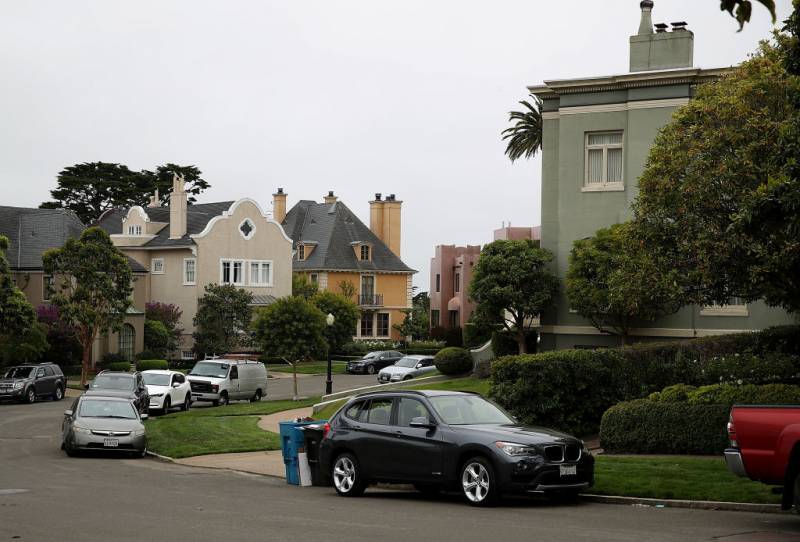The law creates situations where mansions are paying similar taxes as fixer-uppers, “because homes in higher-income communities have increased in value at a faster pace than other homes, making the effects of Prop. 13 much larger for those homeowners,” Levin wrote in the report.
While the study focused on Oakland, Levin said the findings shed light on how Prop. 13 affects communities across the state. The owner of a 6,740-square-foot mansion in San Francisco estimated to be worth $9 million paid $5,625 in property taxes in 2020, according to the Tax Fairness Project, which analyzed county tax records and market values on home-buying websites such as Zillow. Across the bay in Richmond, the owner of a 991-square-foot home worth $331,000 and in need of repairs paid almost as much tax at $5,240.
Luke Quirk, 42, purchased a four-bedroom home in Concord with his wife and two children for about $697,000 in 2015. While he pays more than $9,000 annually in property taxes, he said, his long-time homeowner neighbor told him he pays about $3,700 in taxes, though their houses are similar sizes.
Still, Quirk, who works in pharmaceuticals, is saving, too. Since 2015, his house has risen in value to about $1.1 million.
But Quirk said he thinks the next couple with children who want to buy a family home in the blue-collar suburb of Concord won’t have it as good.
“Not only are they going to be absolutely devastated by their mortgage payment, they are going to be paying four times what their neighbor pays if their neighbor has been around since 1999. It just doesn’t seem fair for the same services,” he said.
People often assume that Prop. 13 yields large benefits for all homeowners, but “that’s just not the case,” said Jacob Denney, co-author of the report and economic justice policy director at SPUR.
“Where you live within your city matters,” he said. And race and ethnicity matter, too.
For example, Oakland homeowners in white neighborhoods pay taxes on homes that, on average, are assessed at $693,924 below their market value, the study says, resulting in $9,631 per home in property tax breaks.
Homeowners in Latino neighborhoods also pay taxes on homes that are under-assessed, but by an average of $216,430, resulting in about $3,000 in tax breaks per home — a third of the savings in white neighborhoods, according to the analysis.
While the study identifies neighborhoods as white, Black, Latino or Asian, in most cases those races or ethnicities did not make up the majority of the population but represented large proportions of those parts of the city.
More white residents in Oakland benefitted in general from Prop. 13 because more own their homes than other racial groups. White residents make up 28% of the city’s population but represent 43% of its homeowners, the report found.
Latino, Black and Asian residents are more likely to rent, a likely legacy of redlining, Denney said, referring to a banking practice that kept residents of poor neighborhoods, and largely neighborhoods of color, from obtaining bank loans to purchase or refinance their homes.
“The wealthiest neighborhoods receive the most [tax breaks], which helps them build more wealth for their communities that were already benefiting from lots of wealth,” Denney said.
Added Levin in the report, “Even when people of color do own their homes, their tax savings from Prop. 13 are smaller than those of majority white communities.”
Low property taxes from Prop. 13 also mean fewer tax dollars for Oakland. Critics say removing the proposition would be a game changer for the city.
The report found that if Oakland homes were taxed at their current market value, the city would gain an estimated $400 million in annual revenue. That’s more than the city’s current budgets for its transportation, fire, housing and community development, and human services departments combined.
But such solutions are complicated. Lower-income households may be getting a far smaller subsidy, but it’s a subsidy nonetheless.
Doing away with Prop. 13 altogether would have far-reaching implications, including the potential to make property taxes unaffordable for lower-income families and retired seniors who rely on a fixed income and low-property taxes to keep their homes, said Susan Shelley, a spokesperson for the Howard Jarvis Taxpayers Association, an organization working to protect Prop. 13.
“You can look at the data any way you want,” she said, adding that raising property taxes would “knock the middle class of California out of homeownership.”
Levin said he hopes for “a system that makes California look like the other 49 states … Every other state does it another way and they do fine.”
Other states have higher caps on property taxes and assessed values, and many have higher rates for commercial properties. Massachusetts, for example, allows cities to tax commercial property at nearly double the rate of residential property, while New York allows for an annual reassessment increase of 6% instead of California’s 2%.
But in California, Prop. 13 remains popular.
A 2018 poll from the Public Policy Institute of California found that 57% of adults thought the measure was “mostly a good thing,” while 23% believed it was “mostly a bad thing.”
In 2020 a ballot initiative that would have changed part of it by requiring that commercial properties be taxed at their market value lost 52%-48%, a difference of more than 600,000 votes.
Denney said, “The conversation we have to have with the people of California is: Is the personal money saved worth it?”
